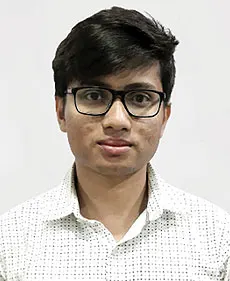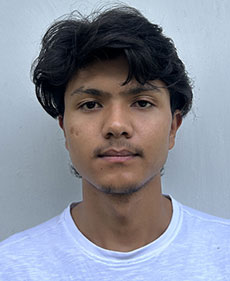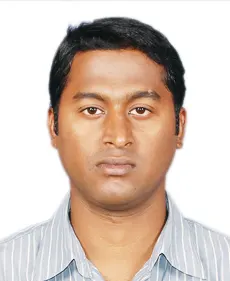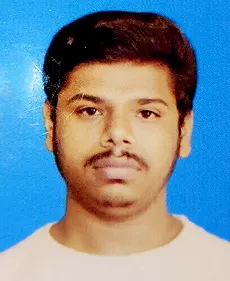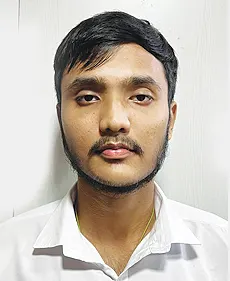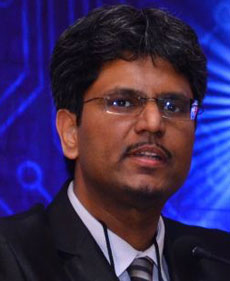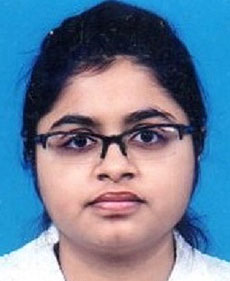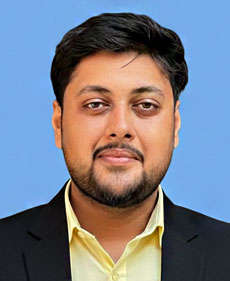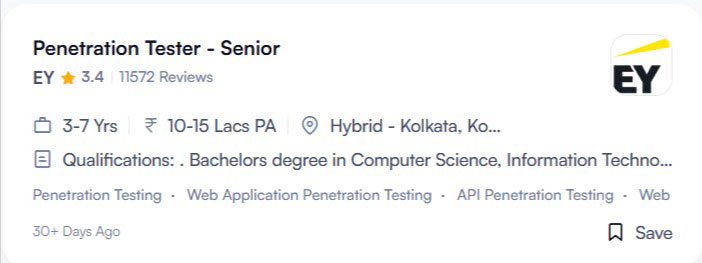| Cyber Law and Ethics | Cyber Forensics | Vulnerability Analysis | Penetration Testing and Incident Handling | Malware Analysis |
| Cyber Threat and Modelling | Operating System & System Programming (LINUX) | Cryptography & Information Security | Parallel and Distributed Computing | Virtualisation and Cloud Security |
| Auditing IT Infrastructures for Compliance | Big Data & IoT Security Penetration Testing | Artificial Intelligence in Cyber Security & other industrial uses | ||
| Certified Ethical Hacker (Training) | ||||
Practical sessions will be conducted by seasoned industry professionals—auditors with over 26 years of experience and credentials including CEH, ECSA, LPT, OSCP, OSCE, and ISO 27001 Lead Auditor—at the ISOAH office in Salt Lake Sector V. Theoretical instruction will be delivered by faculty members from George College at the NIMAS Barasat Campus.
ISOAH Saltlake Campus
Kariwala Towers, 4th Floor, Plot J/1-5, Block EP, Sector V, Salt Lake City, Kolkata - 700091
George College Barasat Campus
NIMAS - HL No. 1045/1/A, Barrackpore Barasat Road. Bus Stop - Talikhola, (Behind Loknath Mandir) Kolkata - 700125
Program Highlight:
- Practical Lab with latest tools
- Tutors are auditors working with industry
- Interactive sessions
- Hacking contests, projects, regular assignments
- Interview preparation for cyber security jobs
- Internship for all students
- Placement assistance for students with good grades
Industry Scope:
As per Nasscom, India will need
5 lakhs cyber security professionals over the coming 5 years. We currently have only 50,000. There is an acute deficit of skilled cyber security professionals in the industry. The demand will rise with Digital India & Industry 4.0 drive.
Jobs:
- Penetration Tester
- ISO 27001 Auditor / Implementer
- System Administrator
- Web/Mobile Application Penetration Tester
- Software Developer
- Malware Analyst
- Information Security Researcher (ML & AI)
Companies our students are working in:
 Kolkata Police
Kolkata Police
 CID West Bengal
CID West Bengal
 Intel Corporation
Intel Corporation
 PwC India
PwC India
ISOAH (Indian School of Anti-Hacking) is a trusted team of ethical hackers with over 26 years of individual experience in cybersecurity. The team has worked both in India and abroad, offering expert training and consultancy to multinational companies, government departments, and educational institutions. Some of ISOAH's audit clients include Apollo Gleneagles Hospitals, CESC, Bandhan Bank, Jadavpur University, AMRI Hospitals, Spencer's, Ambuja Realty, and ABP Ltd. Every year, ISOAH trains around 1,200 students, many of whom go on to work with top companies like Ernst & Young (E&Y), PWC, Deloitte, Tata Steel, Intel, Apple, Oracle, Amazon, TCS, and Cognizant. ISOAH is also an active committee member of NASSCOM East and CII ICT East, helping shape the future of cybersecurity in the region.
Duration
4 years - 8 Semesters
Eligibility
10+2 in Science or Commerce or Arts (Any One Can Join). There is no prerequisite on percentage.
Course Fees
Admission Fee
Rs.8,000/- (One time)
Caution Deposit
Rs.8,000/- (One time)
Forms & Prospectus
Rs.300/- (One time)
Semester Fee
Rs.37,000/- per semester (Total 8 semesters)
Total Fee
Rs.3,10,300/-
Success Stories
What You Will Get?
4 Years
of in-depth Training by the Best Cyber Security Experts
On Campus Placement
Opportunities in Multinational Companies
B.Sc. Degree in Cyber Security
by MAKAUT, West Bengal
Career Growth in Cyber Security

Course Details
- Course: B.Sc. in Cyber Security.
- Degree: Bachelor Degree from MAKAUT (State Govt University).
- Duration: 8 Semesters (4 years).
- Mode: Full time, 5 days a week. The course consists of both practical and theory training.
- Fee: Rs.37,000/- per Semester (8 Semesters), one-time Registration Fee (Admission Fee, Development Fees & Caution Fees) of Rs.16,300/-. Total course fee is Rs.3,10,300/-.
- Venue: ISOAH (Indian School of Anti Hacking), Kariwala Towers, 4th Floor, Plot J/1-5, Block EP, Sector V, Salt Lake City, Kolkata - 700091 – MAKAUT University, WB Partner Institute (Previously WBUT, State Govt University).
George College Barasat Campus, NIMAS - HL No. 1045/1/A, Barrackpore Barasat Road. Bus Stop - Talikhola, (Behind Loknath Mandir) Kolkata - 700125
| Sem | Major (Offline) |
Minor (Blended Mode) |
|---|---|---|
| Sem: I | Major (Offline): Fundamentals of Computing – using C and C++ language (including lab) (Code Theory-FYCYS 101, Lab-FYCYS 191) - 3+2 credits Basic Mathematics and Statistics (including lab) (Code Theory-FYCYS 102, Lab-FYCYS 192) – 3+2 credits |
Minor (Blended Mode): (1 sub x 3 credits) Principles Of Management |
| Sem: II | Major (Offline): Computer Architecture and Object Oriented Concepts (including lab) (Code Theory-FYCYS 201, Lab-FYCYS 291) – 3+2 credits Data Structures and Algorithms (including lab) (Code Theory-FYCYS 202, Lab-FYCYS 292) – 3+2 credits |
Minor (Blended Mode): (1 sub x 3 credits) Organization Behaviour/Busin ess Ethics & Corporate Governance |
| Sem: III | Major (Offline): Python Programming (including lab) (Code Theory-FYCYS 301, Lab-FYCYS 391) – 3+2 credits Operating System and DBMS (including lab) (Code Theory-FYCYS 302, Lab-FYCYS 392) – 3+2 credits |
Minor (Blended Mode): (1 sub x 4 credits) Principles of Marketing/Business & Sustainability |
| Sem: IV | Major (Offline): Design and Analysis of Algorithms (including lab) (Code Theory-FYCYS 401, Lab-FYCYS 491) – 2+2 credits Ethical Hacking and Systems Defence (including lab) (Code Theory-FYCYS 402, Lab-FYCYS 492)– 3+2 credits Cryptography and Information Security (including lab) (Code Theory-FYCYS 403, Lab-FYCYS 493)– 2+2 credits |
Minor (Blended Mode): Human resource management / Corporate Social Responsibility (CSR) (4 credits) Sales and distribution management / E-Commerce (4 credits) |
| Sem: V | Major (Offline): Cyber Systems & Cyber Threat and Modelling (including lab) (Code Theory-FYCYS 501, Lab-FYCYS 591) – 3+2 credits Vulnerability Analysis, Penetration Testing and Incident Handling (including lab) (Code Theory-FYCYS 502, Lab-FYCYS 592) – 3+2 credits |
Minor (Blended Mode): Financial management (4 credits) Entrepreneurship (4 credits) |
| Sem: VI | Major (Offline): Cyber Forensics (Code FYCYS 601) – 4+1 credits Malware Analysis (Code FYCYS 602) – 4+1 Credits Advanced Computer Network and Security(including lab) (Code Theory-FYCYS 603, Lab-FYCYS 693) – 2+2 credits |
Minor (Blended Mode): Customer relationship management (4 credits) Career planning and management / Managing Workplace Diversity (4 credits) |
| Sem: VII | Major (Offline): Minor Project (Code FYCYS 781) – 5 credits Software Project Management (Code FYCYS 701) – 4+1 credits Artificial Intelligence in Security (Code FYCYS 702) – 3+1 credits |
Minor (Blended Mode): Consumer behaviour / Exploring Business Opportunity (4 credits) Strategic management / Intellectual Property Rights (4 credits) |
| Sem: VIII | Major (Offline): Major Project (continuation of minor project) (Code FYCYS 881) – 5 credits Security in E-business (Code FYCYS 801) - 4+1 credits |
|
| Major (Offline): 19 sub - 91 credits |
Minor (Blended Mode): 11 sub – 42 credits |
Fundamentals of Computing - using C and C++ Language | |||
|---|---|---|---|
| Module Number | Content | Total Hours | %age of Questions |
Theory (Code – FYCYS 101) | |||
| Module Number: M 1 | Content: Computer fundamentals | Total Hours: 6 | %age of Questions: 10 |
| Module Number: M 2 | Content: Programming method | Total Hours: 3 | %age of Questions: 10 |
| Module Number: M 3 | Content: General problem solving concepts | Total Hours: 6 | %age of Questions: 20 |
| Module Number: M 4 | Content: Control Flow, Function, Arrays & Pointers | Total Hours: 16 | %age of Questions: 20 |
| Module Number: M 5 | Content: Structures Input & Output | Total Hours: 4 | %age of Questions: 20 |
| Module Number: M 6 | Content: C++ Basics | Total Hours: 5 | %age of Questions: 20 |
| Total Hours: 40 | %age of Questions: 100 | ||
Practical (FYCYS 191) | |||
| Module Number: M 7 | Content: C and C++ Programs | Total Hours: 60 | %age of Questions: 100 |
| Total Hours: 60 | %age of Questions: 100 | ||
Basic Mathematics and Statistics | |||
| Module Number | Content | Total Hours | %age of Questions |
Theory (Code – FYCYS 102) | |||
| Module Number: M 1 | Content: Discrete Mathematics | Total Hours: 8 | %age of Questions: 10 |
| Module Number: M 2 | Content: Algebraic Structures and Morphism | Total Hours: 8 | %age of Questions: 25 |
| Module Number: M 3 | Content: Combinatorics and Probability | Total Hours: 6 | %age of Questions: 10 |
| Module Number: M 4 | Content: Frequency Distribution | Total Hours: 10 | %age of Questions: 25 |
| Module Number: M 5 | Content: Introduction to Statistics | Total Hours: 14 | %age of Questions: 20 |
| Module Number: M 6 | Content: Bivariate Statistics | Total Hours: 10 | %age of Questions: 10 |
| Total Hours: 56 | %age of Questions: 100 | ||
Practical (FYCYS 192) | |||
| Module Number: M 7 | Content: Application of C program | Total Hours: 20 | %age of Questions: 100 |
| Total Hours: 20 | %age of Questions: 100 | ||
Computer Architecture and Object Oriented Concepts | |||
|---|---|---|---|
| Module Number | Content | Total Hours | %age of Questions |
Theory (Code – FYCYS 201) | |||
| Module Number: M 1 | Content: Computer Organization & Memory System | Total Hours: 10 | %age of Questions: 20 |
| Module Number: M 2 | Content: Computer Arithmetic | Total Hours: 10 | %age of Questions: 25 |
| Module Number: M 3 | Content: Input and Output System | Total Hours: 10 | %age of Questions: 30 |
| Module Number: M 4 | Content: Instruction Set and addressing modes | Total Hours: 10 | %age of Questions: 25 |
| Total Hours: 40 | %age of Questions: 100 | ||
Practical (Code - FYCYS 291) | |||
| Module Number: M 5 | Content: Concepts of OOP & Basics of Java | Total Hours: 15 | %age of Questions: 40 |
| Module Number: M 6 | Content: Objects and Classes | Total Hours: 45 | %age of Questions: 60 |
| Total Hours: 60 | %age of Questions: 100 | ||
Data Structures and Algorithms | |||
| Module Number | Content | Total Hours | %age of Questions |
Theory (Code – FYCYS 202) | |||
| Module Number: M 1 | Content: Concepts of Abstract data type | Total Hours: 6 | %age of Questions: 10 |
| Module Number: M 2 | Content: Data Structure using Array | Total Hours: 6 | %age of Questions: 20 |
| Module Number: M 3 | Content: Linked List | Total Hours: 6 | %age of Questions: 20 |
| Module Number: M 4 | Content: Trees | Total Hours: 6 | %age of Questions: 10 |
| Module Number: M 5 | Content: Graphs & Hashing | Total Hours: 10 | %age of Questions: 20 |
| Total Hours: 40 | %age of Questions: 100 | ||
Practical (Code - FYCYS 292) | |||
| Module Number: M 6 | Content: Data Structure using Array | Total Hours: 6 | %age of Questions: 20 |
| Module Number: M 7 | Content: Searching and Sorting | Total Hours: 12 | %age of Questions: 20 |
| Module Number: M 8 | Content: Linked List | Total Hours: 12 | %age of Questions: 20 |
| Module Number: M 9 | Content: Trees | Total Hours: 15 | %age of Questions: 20 |
| Module Number: M 10 | Content: Graphs & Hashing | Total Hours: 15 | %age of Questions: 20 |
| Total Hours: 60 | %age of Questions: 100 | ||
Python Programming & Python Programming Lab | |||
|---|---|---|---|
| Module Number | Content | Total Hours | %age of Questions |
Theory (Code – FYCYS 301) | |||
| Module Number: M 1 | Content: Introduction to Python | Total Hours: 12 | %age of Questions: 20 |
| Module Number: M 2 | Content: Conditions & Iterations | Total Hours: 8 | %age of Questions: 20 |
| Module Number: M 3 | Content: Recursion, Strings, List, Dictionaries, Tuples | Total Hours: 10 | %age of Questions: 30 |
| Module Number: M 4 | Content: Classes & Objects | Total Hours: 10 | %age of Questions: 30 |
| Total Hours: 40 | %age of Questions: 100 | ||
Practical (Code - FYCYS 391) | |||
| Module Number: M 5 | Content: Introduction to Python | Total Hours: 18 | %age of Questions: 20 |
| Module Number: M 6 | Content: Conditions & Iterations | Total Hours: 12 | %age of Questions: 20 |
| Module Number: M 7 | Content: Recursion, Strings, List, Dictionaries, Tuples | Total Hours: 15 | %age of Questions: 30 |
| Module Number: M 8 | Content: Classes& Objects | Total Hours: 15 | %age of Questions: 30 |
| Total Hours: 60 | %age of Questions: 100 | ||
Operating Systems and Database Management Systems | |||
| Module Number | Content | Total Hours | %age of Questions |
Theory (Code – FYCYS 302) | |||
| Module Number: M 1 | Content: Introduction | Total Hours: 3 | %age of Questions: 10 |
| Module Number: M 2 | Content: Process | Total Hours: 10 | %age of Questions: 25 |
| Module Number: M 3 | Content: Resource Manager | Total Hours: 8 | %age of Questions: 10 |
| Module Number: M 4 | Content: Introducing to Data and Data Management | Total Hours: 4 | %age of Questions: 10 |
| Module Number: M 5 | Content: Data Models and Architecture of DBMS | Total Hours: 6 | %age of Questions: 20 |
| Module Number: M 6 | Content: Data Modeling using ER Modeling | Total Hours: 7 | %age of Questions: 10 |
| Module Number: M 7 | Content: Relational Model and Relational Database Management System | Total Hours: 7 | %age of Questions: 15 |
| Total Hours: 45 | %age of Questions: 100 | ||
Practical (Code - FYCYS 392) | |||
| Module Number: M 8 | Content: Introduction | Total Hours: 3 | %age of Questions: 10 |
| Module Number: M 9 | Content: Process | Total Hours: 15 | %age of Questions: 25 |
| Module Number: M 10 | Content: Resource Manager | Total Hours: 9 | %age of Questions: 10 |
| Module Number: M 11 | Content: Introducing to Data and Data Management | Total Hours: 6 | %age of Questions: 10 |
| Module Number: M 12 | Content: Data Models and Architecture of DBMS | Total Hours: 9 | %age of Questions: 20 |
| Module Number: M 13 | Content: Data Modeling using ER Modeling | Total Hours: 9 | %age of Questions: 10 |
| Module Number: M 14 | Content: Relational Model and Relational Database Management System | Total Hours: 9 | %age of Questions: 15 |
| Total Hours: 60 | %age of Questions: 100 | ||
Design and Analysis of Algorithms | |||
|---|---|---|---|
| Module Number | Content | Total Hours | %age of Questions |
Theory (Code – FYCYS 401) | |||
| Module Number: M 1 | Content: Complexity Analysis | Total Hours: 8 | %age of Questions: 20 |
| Module Number: M 2 | Content: Algorithm Design by Divide and Conquer | Total Hours: 8 | %age of Questions: 20 |
| Module Number: M 3 | Content: Disjoint Set Data Structure | Total Hours: 8 | %age of Questions: 20 |
| Module Number: M 4 | Content: Algorithm Design by Greedy Strategy | Total Hours: 8 | %age of Questions: 10 |
| Module Number: M 5 | Content: Algorithm Design by Dynamic Programming | Total Hours: 8 | %age of Questions: 10 |
| Module Number: M 6 | Content: 6 Algorithm Design byb Backtracking | Total Hours: 8 | %age of Questions: 20 |
| Total Hours: 48 | %age of Questions: 100 | ||
Practical (Code - FYCYS 491) | |||
| Module Number: M 7 | Content: Implement Merge sort | Total Hours: 9 | %age of Questions: 10 |
| Module Number: M 8 | Content: Implement Quicksort | Total Hours: 9 | %age of Questions: 10 |
| Module Number: M 9 | Content: Find maximum and minimum elements froman array of integers using divide and conquerstrategy | Total Hours: 6 | %age of Questions: 10 |
| Module Number: M 10 | Content: Implement fractional knapsack | Total Hours: 6 | %age of Questions: 10 |
| Module Number: M 11 | Content: Implement Job sequence withdeadline | Total Hours: 9 | %age of Questions: 10 |
| Module Number: M 12 | Content: Implement Kruskal's algorithm | Total Hours: 9 | %age of Questions: 10 |
| Module Number: M 13 | Content: Implement Prim’s algorithm | Total Hours: 9 | %age of Questions: 10 |
| Module Number: M 14 | Content: Implement Dijkstra's algorithm | Total Hours: 9 | %age of Questions: 10 |
| Module Number: M 15 | Content: Implement Matrix ChainMultiplication | Total Hours: 9 | %age of Questions: 10 |
| Module Number: M 16 | Content: Implement Floyd WarshallAlgorithm | Total Hours: 9 | %age of Questions: 10 |
| Total Hours: 58 | %age of Questions: 100 | ||
Ethical Hacking and Systems Defence | |||
| Module Number | Content | Total Hours | %age of Questions |
Theory (Code – FYCYS 402) | |||
| Module Number: M 1 | Content: Introduction to Ethical Hacking | Total Hours: 10 | %age of Questions: 25 |
| Module Number: M 2 | Content: System Hacking | Total Hours: 14 | %age of Questions: 25 |
| Module Number: M 3 | Content: TCP/IP - OverviewConcepts and PortScanning | Total Hours: 14 | %age of Questions: 30 |
| Module Number: M 4 | Content: Desktop and Server OS Vulnerabilities | Total Hours: 10 | %age of Questions: 20 |
| Total Hours: 48 | %age of Questions: 100 | ||
Practical (Code - FYCYS 492) | |||
| Module Number: M 5 | Content: System and Network Security | Total Hours: 24 | %age of Questions: 60 |
| Module Number: M 6 | Content: Identifying vulnerabilities in OS | Total Hours: 24 | %age of Questions: 40 |
| Total Hours: 48 | %age of Questions: 100 | ||
Cryptography and Information Security | |||
| Module Number | Content | Total Hours | %age of Questions |
Theory (Code – FYCYS 403) | |||
| Module Number: M 1 | Content: Overview of cryptography, numbersystem | Total Hours: 10 | %age of Questions: 20 |
| Module Number: M 2 | Content: One time pad andstream ciphers | Total Hours: 10 | %age of Questions: 20 |
| Module Number: M 3 | Content: Block ciphers, message integrity | Total Hours: 14 | %age of Questions: 30 |
| Module Number: M 4 | Content: Public key cryptography, digital signature | Total Hours: 14 | %age of Questions: 30 |
| Total Hours: 48 | %age of Questions: 100 | ||
Practical (Code - FYCYS 493) | |||
| Module Number: M 5 | Content: Arithmetic modulo, programming | Total Hours: 28 | %age of Questions: 40 |
| Module Number: M 6 | Content: Cryptography algorithm design and programming | Total Hours: 30 | %age of Questions: 60 |
| Total Hours: 58 | %age of Questions: 100 | ||
Our Classroom and Cyber Lab
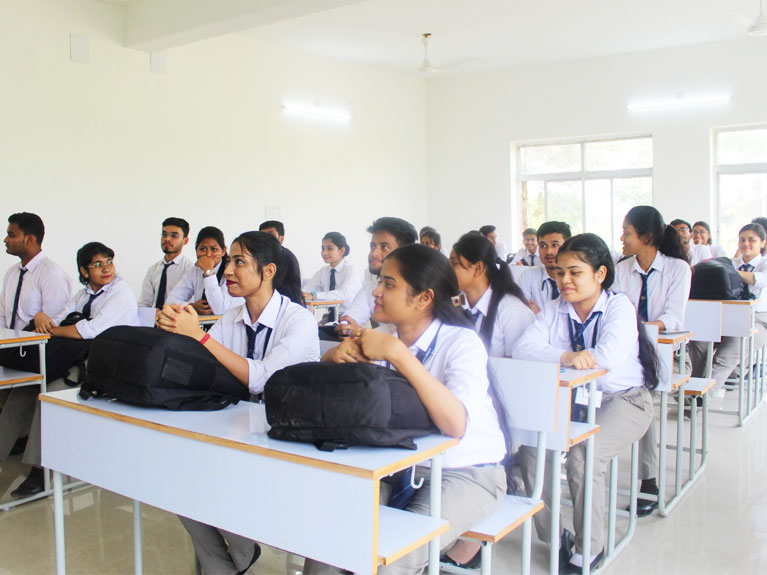
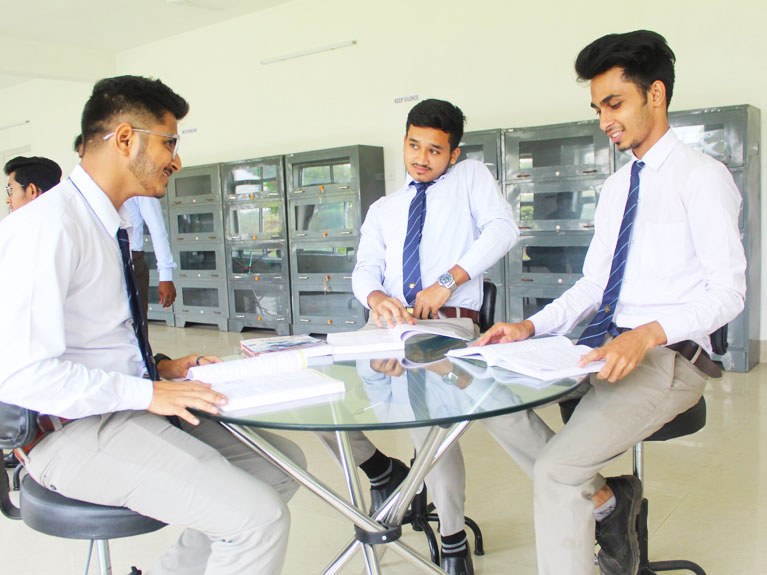
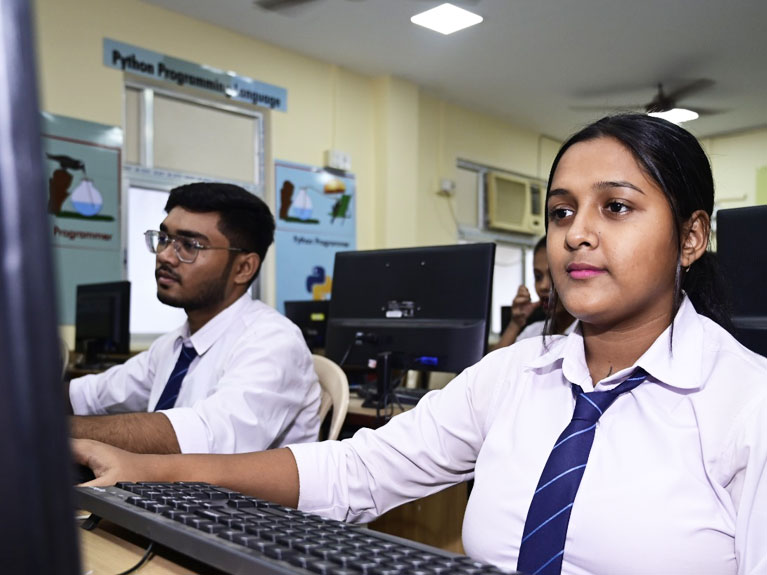
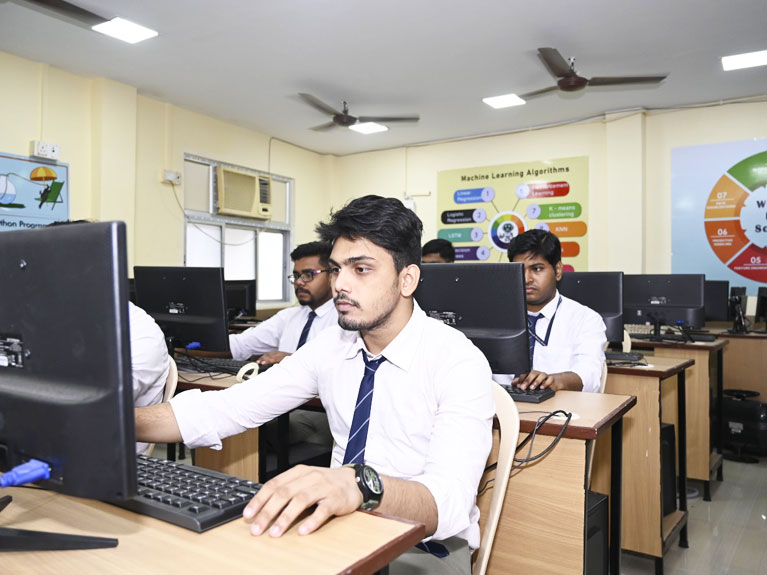
Enroll Now
Fields marked with * are mandatory.
Job Prospects & Job Sources
After completing a B.Sc in Cyber Security, students can explore a wide range of job roles such as Information Risk Auditor, Firewall Administrator, Security Analyst, Software Security Developer, Intrusion Detection Specialist, Incident Responder, Cryptographer, Vulnerability Assessor, Lead Security Architect, and Chief Information Security Officer (CISO).
Freshers typically earn between ₹30,000 to ₹2,00,000 per month, depending on their skills, certifications, and the hiring organisation. According to NASSCOM, India will need over 5 lakh cybersecurity professionals in the next 5 years, yet it currently has only about 50,000 trained experts.
The salary growth in this field has been impressive, with an average increase of 25% to 35% over recent years.
The growing focus on Digital India, along with rising threats in the digital space, is driving high demand for skilled cybersecurity professionals. Some of the largest employers are in industries such as banking, financial services, e-commerce, telecom, and government agencies.
FAQs
- Cyber Law and Ethics
- Cyber Forensics
- Vulnerability Analysis
- Penetration Testing, and Incident Handling
- Malware Analysis
- Cyber Threat and Modelling
- Operating System & system programming (LINUX)
- Cryptography & Information Security
- Parallel and Distributed Computing
- Virtualisation and Cloud Security
- Auditing IT Infrastructures for Compliance
- Big Data & IoT Security Penetration testing
- Artificial Intelligence In Cyber security & Industry use cases
The program spans 4 years, divided into 8 semesters. It combines theoretical knowledge with practical training, ensuring students gain hands-on experience in cybersecurity tools and methodologies.
The course is administered in equal measures of practical and theory.
Candidates who have completed 10+2 in Science, Commerce, or Arts are eligible to apply. There is no minimum percentage requirement, making the course accessible to a broad range of students.
Practical sessions are held at the ISOAH Saltlake Campus, while theoretical classes take place at the George College Barasat Campus (NIMAS).
Yes, the program includes internship opportunities for all students, providing real-world experience and enhancing employability in the cybersecurity domain.
The course is taught by a blend of industry experts and academic professionals. Practical sessions are conducted by seasoned auditors with certifications like CEH, ECSA, LPT, OSCP, and ISO 27001 Lead Auditor. Theoretical classes are delivered by professors from George College at the NIMAS Barasat Campus.
While a Computer Science degree covers a broad range of topics like programming, algorithms, and databases, the B.Sc. in Cyber Security focuses deeply on ethical hacking, digital forensics, malware analysis, network security, and ISO standards. It's designed specifically to prepare students for cybersecurity careers, not just software development.
Yes. The course is beginner-friendly and starts with the basics of computer systems and programming. Even if you come from a non-technical background, the step-by-step curriculum and practical labs ensure you can learn and grow into the cybersecurity domain.
Yes. This is a UGC-recognised B.Sc. (Hons) degree under MAKAUT (a government university), making it valid for government jobs, higher studies, and recognised internationally for cybersecurity roles and certifications.
Students will work with real-world cybersecurity tools such as:
- Kali Linux
- Wireshark
- Burp Suite
- Metasploit
- Nmap
- Cisco Packet Tracer
- SIEM solutions
The course includes live lab simulations, real case studies, and vulnerability assessment tasks.
The total fee for the 4-year program is Rs. 3,10,300, which includes:
- Admission Fee: Rs. 8,000 (one-time)
- Caution Deposit: Rs. 8,000 (one-time)
- Forms & Prospectus: Rs. 300 (one-time)
- Semester Fee: Rs. 37,000 per semester (8 semesters)
Graduates can pursue roles such as:
- Penetration Tester
- ISO 27001 Auditor/Implementer
- System Administrator
- Web/Mobile Application Penetration Tester
- Software Developer
- Malware Analyst
- Information Security Researcher (ML & AI)
Students have secured positions in organizations like Kolkata Police Cyber Cell, CID West Bengal, Intel Corporation, and PwC India.
Admission Fee, Caution Deposit, Forms & Prospectus
Rs.16,300/-
One Time
Semester Fees
Rs.37,000/-
Per Semester
(Total 8 semesters)
Hacking Tutorials
Read All Tutorials »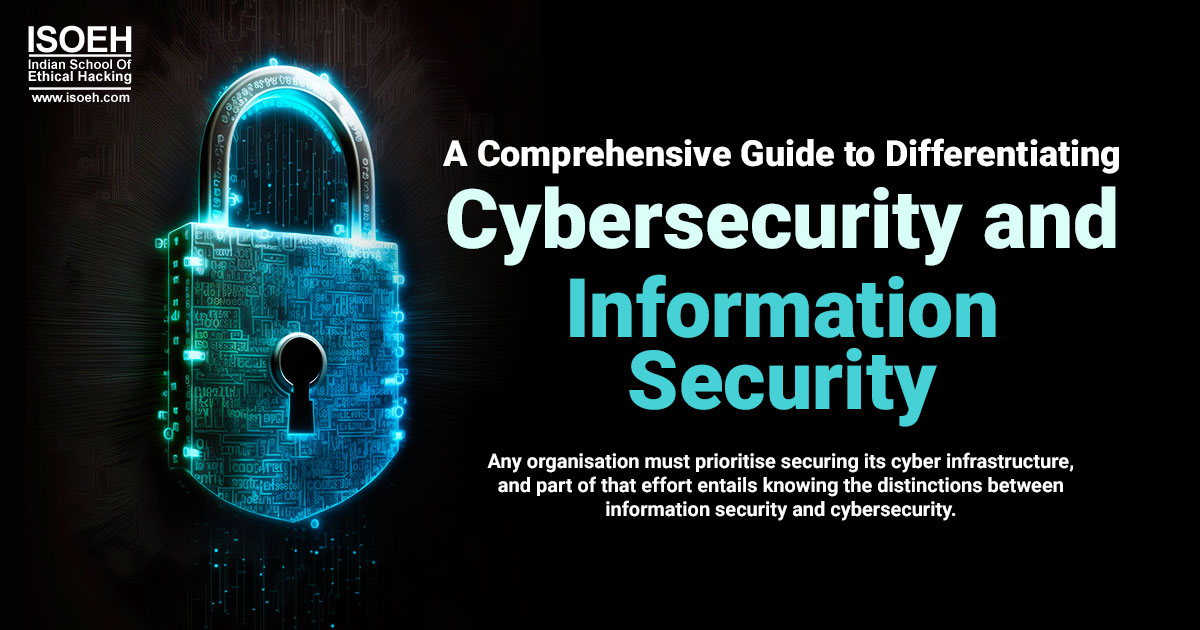
A Comprehensive Guide to Differentiating Cybersecurity and Information Security
Read Details »Hacking Videos
Explore All Videos »How to Hiding Your Secret File using Steganography?
View On Youtube »Member of:








